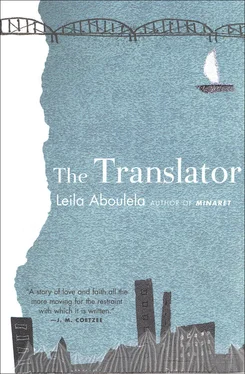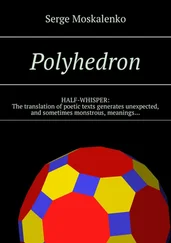Sammar shrugged, ‘It’s not the same situation.’
‘Is he going to say the shahadah without meaning it, just to marry you?’
‘I don’t know.’
Yasmin didn’t say anything in response. She moved her chair to face the bed and put her feet up. Her stockings were a colour Sammar would not wear. Sammar thought that if she had offered to do Rae’s laundry for him, his socks would be drying now on the radiators. What would Yasmin have said about that?
‘You’re leaving in a few weeks’ time,’ said Yasmin. ‘If I were you, I’d avoid him like the plague till then. Go home and maybe you’ll meet someone normal, someone Sudanese like yourself. Mixed couples just don’t look right, they irritate everyone.’
‘But he’s very nice. Don’t you think he’s nice?’
‘All that coughing and spluttering gets on my nerves.’
Sammar laughed. ‘You’re horrible,’ she said.
‘I’m worried, that’s all,’ said Yasmin. ‘Have you talked to him about becoming a Muslim.’
‘Not really, no. But he always says good things about Islam, things I didn’t even know. He understands…’
‘That’s his work, the field in which he is very highly thought of. But his interest, as far as I know, is just an academic interest.’
‘But it could become more than that…’
‘Do you know if he even believes in God?’
‘Of course he believes in God. He’s not empty inside.’
‘Atheists can be as nice as anyone else. Being good or kind has nothing to do with it.’
‘Also, he told me that he believes that the Qur’an is a sacred text…’
‘That’s the way they do research nowadays. It’s a modern thing.
Something to do with not being Eurocentric. They take what each culture says about itself. So they could study all sorts of sacred texts and be detached. They could have their own religious views or be atheists…’
‘You think Rae is an atheist?’
‘I wouldn’t be surprised. I would not be surprised at all.’
Sammar put the iron down. Never in her life had anyone she cared about been an unbeliever. Not religious, yes, not praying, not particularly caring about what’s right or wrong, but always the faith was there, always Allah was there, His existence never denied. It was unbearable to think that Rae was so unaware.
She left the ironing, hurried and put her coat on, covered her hair with a scarf, rummaged for change from her purse.
‘Where are you going?’
His number, where did she have his number? Drawer opened, papers thrown out. She had never telephoned him at home before.
‘What’s wrong with you, where are you going?’
She found the number, ignored Yasmin. She ran down the stairs to the landing. One of the tenants was getting his bicycle from under the stairs. Leather jacket, long hair tied up with an elastic band, the source of the loud music that came through the ceiling. She was frightened of that man and usually listened and checked that he was not coming up or down the stairs before she left her flat. Now when she saw him she dropped one of her coins on the ground and had to bend down and pick it up. When she stood up, he was sneering at her. Then he jerked his bicycle from under the stairs and rattled away. There were chains around his trousers, the sharp step of his boots. When he opened the front door, a gust of cold wind blew in. She shivered. The telephone. Dialing, her fingers awkward, clumsy. Ringing. It rang and rang. She let it ring. It rang and rang. She shivered and the telephone rang, each unanswered ring cutting through an emptiness, a windy place. At last, a sleepy voice, recognition.
‘Rae, do you believe in God?’
In his silence, she banged her head against the wall, gently, rhythmically. The wall felt cool against her forehead, pleasantly solid. The receiver in her hand kept slipping. She thought, I love his voice, he must have been deeply asleep, he is still not well. His voice and how heavy he is inside, heavy enough for me to sink in. All this will be forbidden to me? Where will I… She closed her eyes, banged her forehead against the wall. Mid-January and the afternoon light seeped into the hall, the day beginning to get longer, a subtle change in the sun’s light. When he spoke, it was as if she had expected the silence to last forever, his clear voice startled her, ‘Yes,’ he said, ‘I do.’
‘You’re not a… an… atheist?’ She struggled with the word, so seldom used. She mispronounced it.
‘No, I’m not.’ There was a smile in his voice.
She sat down on the stairs.
‘I thought you knew,’ he said.
‘I wasn’t sure.’
‘I should have been more clear.’
The landing, the bicycles under the stairs, Yasmin upstairs were superseded. ‘I woke you up,’ she said. ‘You were fast asleep.’
‘I dreamt of you.’
‘Tell me.’
He said, ‘I was in a big house with many rooms. It was almost like a mansion. I was hiding because outside the house, I had been followed, chased for days. I carried a sword in my hand and there was blood on it, my enemies’ blood, but I myself, my clothes and my hands were clean and I was proud of that.’
He paused and then went on, ‘I went into a room full of smoke, a lot of smoke but when I checked there was no fire. When I left the room, the handle of my sword broke. I held it broken in my hands and knew that it could never be mended, it could never be reliable again. This was a terrible loss, I don’t know why, but I had this feeling of deep loss because I had to go on without the sword. I walked the other rooms of the house, searching. There were many rooms, halls, passageways. I found a staircase and I began to climb. At the top of the stairs there was a room and you were there.’
‘What was I doing?’
‘Cooking.’
She smiled, ‘Cooking what?’
‘Vegetables, I think.’
She saw green peppers and aubergines. She spoke each word slowly, ‘And was I happy to see you?’
‘You were, very much and then you gave me a glass of milk to drink.’
‘Milk! How childish of me, I’m so sorry.’
He laughed and said, ‘I drank it, I drank it all. I didn’t mind.’
She made soup for him. She cut up courgettes, celery and onions. Her feelings were in the soup. The froth that rose to the surface of the water when she boiled the chicken, the softened, shapeless tomatoes. Pasta shaped into the smallest stars. Spice that she had to search for, the name unknown in English, not in any of the Arabic-English dictionaries that she had. Habbahan, habbahan. She must walk around the supermarket, frantically searching for something she could not ask about, and she was a translator, she should know. Habbahan. Without it, the soup would not taste right, would not be complete. At last, she found the habbahan. It existed, it had a name: whole green cardamom.
Cardamom pods. They must be split open, the seeds inside crushed into powder. It seemed unfair to her that he was all alone, ill alone, that he dragged himself to teach everyday and came back home to an unmade bed, unwashed cups and dishes, meals that he had to cook himself. In the department they said that he was turning into a workaholic. She said to him, they told you at the hospital to take time off work, why don’t you listen? He said that there were too many things that needed to be done.
She put the soup in two plastic containers, carried them to work. She was waiting for him when he came out of the lecture theatre, coughing, his fingers covered in chalk. She saw the change in him, the way he turned his back on everything else, his students who were coming out, the next class that was going in. When he spoke to her it was as if there was no one around, no physical world, his voice different, she had come to realise, than when he talked to others, kind, less sharp. It took him a few minutes to understand what she was saying, what she was carrying, what she was giving to him. Then he said, ‘Oh Sammar,’ in a low voice, too much emotion. So that they were both, after that, unable to say ordinary things, the usual things, ‘thank you very much,’ ‘I hope you like it,’ ‘I will like it for sure’, ‘you can freeze it…’ She turned and made her way down corridors illuminated with fluorescent lights, crowded with students taller than her, their loose denims, rucksacks, soft hair that fell over young eyes.
Читать дальше












